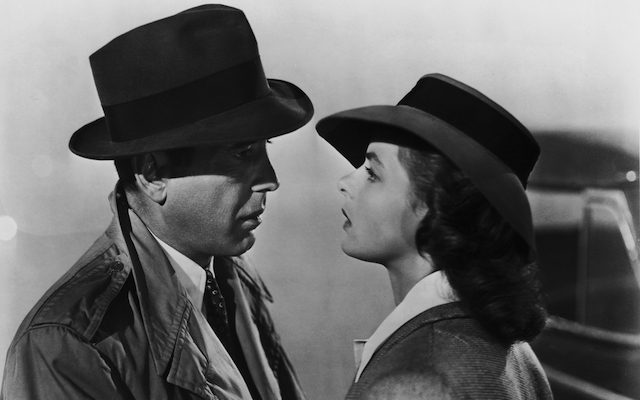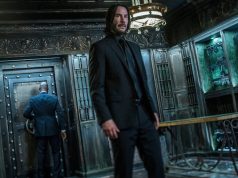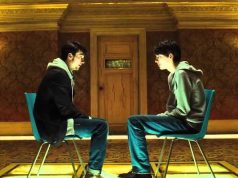
(Note the publication date.)
I’m too young to remember it, but you know what was apparently a big deal? World War II! It was such a big deal that while it was going on, most of the movies that came out were actually about the war, like there was nothing else worth mentioning. One of these is our subject this week, a melodramatic, turd-like obscurity — a meloturdscurity, if you will — called “Casablanca.”
Hoo boy, what a stinker! Where my intern dug this one up, I have no idea. You can tell a movie’s going to be bad when it starts with that cheesy 1940s narrator (every film from that decade must have used the same guy) laying it on really thick about The War, and all the movie can come up with for a visual to underscore the importance of it is … footage of a classroom globe. Eh, we can’t afford to show you the war. Just take our word for it, there’s a war — and it’s happening on a planet that looks like this!
According to the movie, Casablanca is a city in northern Africa where people who want to get away from The War (i.e., everyone?) can hang out while they wait for exit visas. Casablanca is not in the war because it’s owned by the French, who haven’t gotten around to surrendering it yet. So instead of having a war they just have Nazis hanging around, causing trouble but not technically causing trouble, like an annoying brother next to you in the backseat during a car trip saying, “I’m not touching you! I’m not touching you!”
To pass the time while waiting for their papers, people in Casablanca drink a lot. Their provider is Rick Blaine (Humphrey Bogart), proprietor of an American-style cafe reminiscent of the cantina in “Star Wars,” only with more grotesque creatures, e.g., Peter Lorre. Rick himself is a stubby, toad-like man with a monstrously oversized cranium that is not in proportion to the rest of his body. He looks like a theme park mascot. Rick is fond of saying “I stick my neck out for nobody,” but it’s only because if he did, he would tip over from the weight of his giant Easter Island head. Also, not for nothing, but Rick looks like he probably always smells like cigarettes and B.O. But don’t worry, it’s not like he’s the romantic lead in a movie or anything.
Rick’s only friend is Sam (Dooley Wilson), the cafe’s piano player, whom he treats like a human jukebox. One of the filmmakers’ boldest choices was to cast in the role of Sam an actor who evidently had no idea how a piano works, since the way he pretends to play it is to simply flop his lifeless hands haphazardly on the keyboard. He sings without a microphone, too, yet can be heard over the band that accompanies him. Casablanca is a magical place!
The movie farts around for a while with jokey comedy bits involving colorful local characters, as if it’s the pilot episode of a sitcom (specifically, “Cheers”). French weasel Cap. Renault (Claude Rains) is nervous because a Nazi he’s trying to impress is coming to Rick’s tonight to witness the arrest of a resistance fighter, and he wants everything to be juuuust right. (Doh! What if Lucy burns dinner??!) Renault also has the important job of holding conversations with Rick in which he lists things Rick has done before, to provide exposition. This all takes a long time. Hey, movie, isn’t there a war or something? Isn’t that classroom globe in peril? PICK UP THE PACE, MOVIE. I won’t ask you again.
Well, into this situation comes the aforementioned Nazi-perturber, Victor Laszlo (Paul Henreid), accompanied by his gorgeous lady friend, Ilsa (Ingrid Bergman), who recognizes Sam the piano player. Did Ilsa and Sam used to date?? Ha ha, no; it’s 1942. But Ilsa DID used to date Rick, and she knows Sam because I guess Sam has always been Rick’s friend/pianist/soundtrack. She’s like, “Hey, Sam, what’s up? Play that song. You know, the theme from ‘Casablanca.'” And Sam’s like, “No, Miss Ilsa, I don’t want to.” And she’s like, “PLAY THE DAMN SONG, SAM!” And Sam’s like, “YOU’RE NOT THE BOSS OF ME!!” But then he plays it, and Rick storms out of the back room and says angrily, “I thought I told you never to play that song!” and then he sees Ilsa and goes all homina-homina-homina.
Later that night, after the bar has closed, Rick drinks booze and has flashbacks while Sam provides live accompaniment. We learn that Rick and Ilsa were two strangers doin’ it in Paris before the Nazis showed up, and then she ditched him without an explanation. (The obvious explanation is that she is too beautiful to go on having sex with a dog-faced cartoon character, but he did not take the hint.) Now, a few years later, Rick is still steamed about it. He can’t even muster the civility to say “Here’s lookin’ at you, kid,” which he used to say constantly (400 times just in the flashbacks we see).
Ilsa is with Victor now, but she could at least explain to Rick why she left him so suddenly, right? Oh, sure, she could. But maybe first she should hem and haw and stall and be melodramatic about it, forever. Yes. That’s absolutely what she should do. She says she’s reluctant to tell Rick the whole story because he wouldn’t understand. Yet the “whole story” is this: she was married to Victor; she thought he had died in a concentration camp; she hooked up with Rick; she learned Victor was alive after all; she immediately ended the affair. Which is all pretty easy to understand, actually. You hear that summary and you think: Oh, OK, sure. That makes sense. Thank you. Maybe very simple stories with clear causes and effects were harder to comprehend in the ’40s, because of the war?
It doesn’t matter, though, because Rick is NOT letting go of his grudge. He has some letters of transit that Victor and Ilsa need to escape Casablanca, but he won’t hand them over, purely out of spite. He is being a real pill about this. (Our hero, ladies and gentlemen!) Meanwhile, at the bar, some people sing a French song louder than the Nazis sing a German song, so the Nazis shut down the bar like a bunch of babies. Congratulations, Rick. You’re as much of a sore loser as the Nazis are.
Finally, after adamantly refusing to get involved, Rick’s stubbornness subsides and he starts acting like a true American, which is to say he whips out a gun and starts bossing people around. He forces Renault to let Victor and Ilsa get to the airport, then shoots Maj. Strausser. (This was necessary because it was against the Hollywood Code for a movie to end without the male lead killing anyone.) In the grand tradition of Hollywood endings, the repercussions of Rick’s actions are casually dismissed, and he and Renault become best friends who go around covering up murders for each other, probably. I’m pretty sure the reason everyone was so happy when the war ended is that it meant they didn’t have to watch movies like this anymore.
— Film.com





